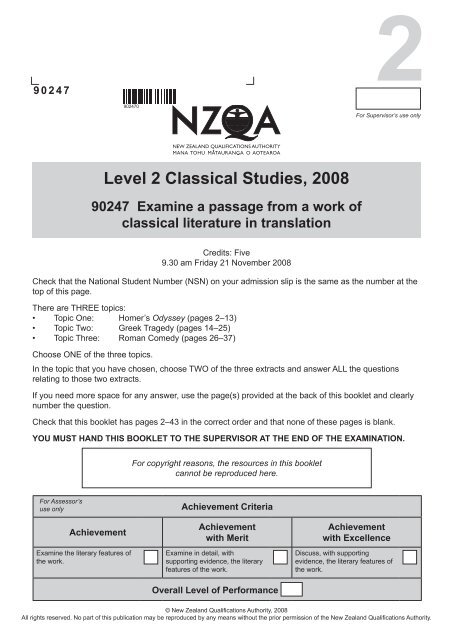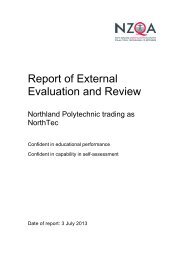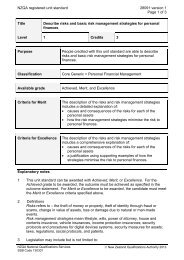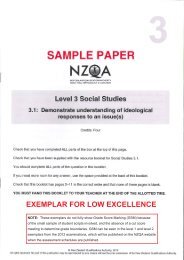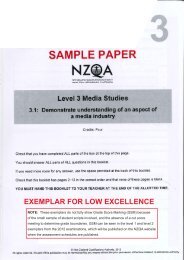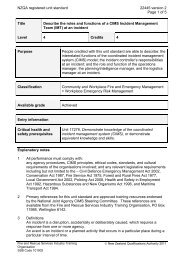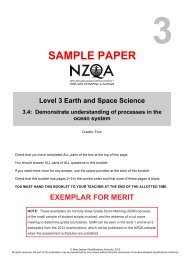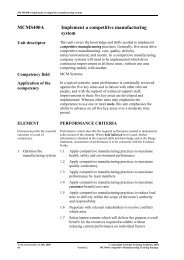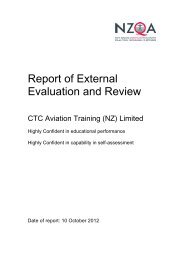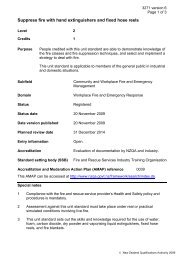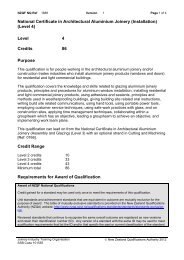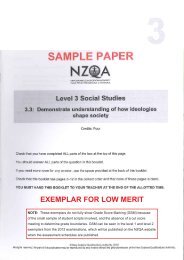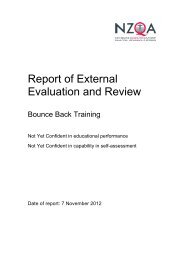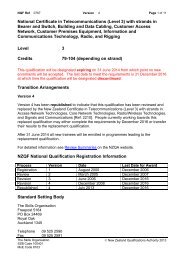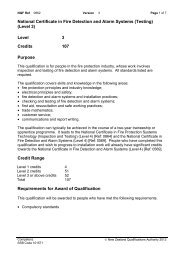Exam - NZQA
Exam - NZQA
Exam - NZQA
Create successful ePaper yourself
Turn your PDF publications into a flip-book with our unique Google optimized e-Paper software.
90247<br />
Level 2 Classical Studies, 2008<br />
90247 <strong>Exam</strong>ine a passage from a work of<br />
classical literature in translation<br />
Credits: Five<br />
9.30 am Friday 21 November 2008<br />
Check that the National Student Number (NSN) on your admission slip is the same as the number at the<br />
top of this page.<br />
There are THREE topics:<br />
• Topic One: Homer’s Odyssey (pages 2–13)<br />
• Topic Two: Greek Tragedy (pages 14–25)<br />
• Topic Three: Roman Comedy (pages 26–37)<br />
Choose ONE of the three topics.<br />
In the topic that you have chosen, choose TWO of the three extracts and answer ALL the questions<br />
relating to those two extracts.<br />
If you need more space for any answer, use the page(s) provided at the back of this booklet and clearly<br />
number the question.<br />
Check that this booklet has pages 2–43 in the correct order and that none of these pages is blank.<br />
YOU MUST HAND THIS BOOKLET TO THE SUPERVISOR AT THE END OF THE EXAMINATION.<br />
For Assessor’s<br />
use only<br />
Achievement<br />
<strong>Exam</strong>ine the literary features of<br />
the work.<br />
902470<br />
For copyright reasons, the resources in this booklet<br />
cannot be reproduced here.<br />
Achievement Criteria<br />
Achievement<br />
with Merit<br />
<strong>Exam</strong>ine in detail, with<br />
supporting evidence, the literary<br />
features of the work.<br />
Overall Level of Performance<br />
Achievement<br />
with Excellence<br />
Discuss, with supporting<br />
evidence, the literary features of<br />
the work.<br />
2<br />
For Supervisor’s use only<br />
© New Zealand Qualifications Authority, 2008<br />
All rights reserved. No part of this publication may be reproduced by any means without the prior permission of the New Zealand Qualifications Authority.
You are advised to spend 50 minutes answering the questions on your chosen topic.<br />
EITHER: TOPIC ONE: HOMER’S ODYSSEY<br />
Choose TWO of the following extracts and answer ALL the questions relating to these two extracts.<br />
EXTRACT A<br />
…<br />
‘ “What on earth is wrong with you, Polyphemus?<br />
It was a matter of life or death: we were in mortal peril.’<br />
2<br />
Classical Studies 90247, 2008<br />
Homer, The Odyssey, Book 9
(a) Odysseus is telling the story of his encounter with the Cyclopes to King Alcinous and the<br />
Phaeacian nobility.<br />
(i) Name the island of the Phaeacians.<br />
(ii) Name the queen of the Phaeacians.<br />
(b) Give TWO specific features of the island of the Cyclopes.<br />
(1)<br />
(2)<br />
(c) Explain TWO ways in which Polyphemus manages his property as humans do.<br />
(1)<br />
(2)<br />
(d) For what practical reason did Odysseus blind Polyphemus rather than kill him?<br />
(e) (i) What view had Polyphemus expressed earlier in Book 9 about the gods, and why is it<br />
strange that he should hold this view?<br />
(ii) Explain in detail what Polyphemus prays for at the end of Book 9.<br />
3<br />
Classical Studies 90247, 2008<br />
Assessor’s<br />
use only
(f) The episode with Polyphemus is particularly concerned with the customs of guest-friendship.<br />
(i) In what way does Odysseus abide by the customs of guest-friendship when he visits<br />
Polyphemus, and what does he expect in return?<br />
(ii) In what TWO ways does Polyphemus violate the customs of guest-friendship?<br />
(1)<br />
(2)<br />
4<br />
Classical Studies 90247, 2008<br />
Assessor’s<br />
use only
(g) The episode with the Cyclopes highlights Odysseus’ heroic nature.<br />
(i) Discuss TWO characteristics of Odysseus that are typical of a Homeric hero. You must<br />
provide evidence from Book 9 to illustrate your answers.<br />
(1)<br />
(2)<br />
(ii) Discuss TWO characteristics of Odysseus that are not typical of a Homeric hero. You<br />
must provide evidence from Book 9 to illustrate your answers.<br />
(1)<br />
(2)<br />
5<br />
Classical Studies 90247, 2008<br />
Assessor’s<br />
use only
EXTRACT B<br />
6<br />
‘Nurse dear, I want you to keep<br />
the women shut up in their quarters till I have stowed away my<br />
father’s fine arms in the store-room.<br />
…<br />
‘I keep no man idle who has eaten my bread, however far he may<br />
have journeyed.’<br />
Classical Studies 90247, 2008<br />
Homer, The Odyssey, Book 19
(a) (i) Name the woman addressed as “Nurse dear” (line 1).<br />
(ii) Name the island on which this scene is set.<br />
(b) Describe the circumstances under which the old nurse recognises Odysseus soon after this<br />
extract.<br />
(c) (i) Whose idea was it to store the weapons in the store-room?<br />
(ii) What is the real reason why the weapons are stored away?<br />
(d) (i) How does Athene help Telemachus while he is storing the weapons in the store-room?<br />
(ii) What is Telemachus’ reaction to this assistance?<br />
7<br />
Classical Studies 90247, 2008<br />
Assessor’s<br />
use only
(e) (i) Explain in detail Athene’s main role in The Odyssey.<br />
(ii) Describe in detail TWO episodes that show Athene fulfilling this role.<br />
(1)<br />
(2)<br />
(f) (i) Name TWO deities, other than Athene and Zeus, who help Odysseus in the poem.<br />
(ii) For EACH deity, explain how and under what circumstances he or she helps Odysseus.<br />
(1)<br />
(2)<br />
8<br />
Classical Studies 90247, 2008<br />
Assessor’s<br />
use only
(g) In this extract Telemachus is very authoritative.<br />
(i) Explain in detail TWO other situations or episodes in the poem where Telemachus<br />
displays the same characteristic.<br />
(1)<br />
(2)<br />
(ii) Discuss THREE other character traits Telemachus displays in the poem that make him<br />
a son worthy of the great hero Odysseus. Provide evidence to illustrate your answer.<br />
(1)<br />
(2)<br />
(3)<br />
9<br />
Classical Studies 90247, 2008<br />
Assessor’s<br />
use only
EXTRACT C<br />
your fears.<br />
…<br />
The shrewd Odysseus smiled at the man and said: ‘Dismiss<br />
So there the Suitors lay in heaps, one upon another.<br />
10<br />
Classical Studies 90247, 2008<br />
Homer, The Odyssey, Book 22
(a) “Sit there till I’ve done the work I have to do indoors.” (lines 5–6)<br />
Exactly what work does Odysseus have to do indoors?<br />
(b) (i) Name “the songful minstrel” (lines 4–5).<br />
(ii) What musical instrument does the minstrel use to accompany his singing?<br />
(c) The reader first meets this minstrel in Book 1, at the symposium in the palace.<br />
(i) What does he sing about?<br />
(ii) Name the person who is upset by this song and asks the minstrel to stop singing.<br />
(d) Later, Odysseus says, “Let our divine minstrel strike up lively dance music for us …”<br />
(Book 23).<br />
11<br />
Explain why Odysseus wants music and dancing in the palace so soon after he has killed the<br />
Suitors.<br />
Classical Studies 90247, 2008<br />
Assessor’s<br />
use only
(e) Explain in detail THREE typical features of minstrels and / or their role in Homeric society.<br />
(1)<br />
(2)<br />
(3)<br />
(f) Homer has used a simile in lines 12–15 (“like fish … ends their lives.”).<br />
Explain in detail THREE ways in which the simile corresponds to the situation it is describing.<br />
(1)<br />
(2)<br />
(3)<br />
12<br />
Classical Studies 90247, 2008<br />
Assessor’s<br />
use only
(g) “The spirit of Odysseus’ revenge is almost totally uncompromising … Revenge was the<br />
hero’s right.” (D. A. Little)<br />
(i) Discuss in detail TWO situations where Odysseus and / or Telemachus exact revenge<br />
in a manner that a modern reader might consider ruthless or brutal. You must explain<br />
exactly what is ruthless or brutal about each situation.<br />
(1)<br />
(2)<br />
(ii) With particular reference to “the hero’s right”, discuss in detail THREE reasons why<br />
Odysseus is totally uncompromising when he kills the Suitors. You must provide<br />
evidence to illustrate your answers.<br />
(1)<br />
(2)<br />
(3)<br />
13<br />
Classical Studies 90247, 2008<br />
Assessor’s<br />
use only
You are advised to spend 50 minutes answering the questions on your chosen topic.<br />
OR: TOPIC TWO: GREEK TRAGEDY<br />
Choose TWO of the following extracts and answer ALL the questions relating to these two extracts.<br />
EXTRACT A<br />
Teiresias: Nor am I bound to Creon’s patronage.<br />
…<br />
14<br />
And at my speaking – you shall be trodden down<br />
With fouler scorn than ever fell on man.<br />
Classical Studies 90247, 2008<br />
Sophocles, King Oedipus
(a) (i) How is Creon related to Oedipus?<br />
(ii) “Your mother’s … curse” (line 8). Name Oedipus’ mother.<br />
(b) What specific accusation has Oedipus made against Creon?<br />
(c) “You have sinned – and do not know it – against your own on earth and in the grave.”<br />
(lines 5–7)<br />
(i) Who is the person “in the grave” that Oedipus has sinned against?<br />
(ii) How has he sinned against this person?<br />
(d) Explain an example of dramatic irony used in this extract. You must quote the relevant words<br />
and explain why they are ironic.<br />
15<br />
Classical Studies 90247, 2008<br />
Assessor’s<br />
use only
(e) (i) What exactly is Cithaeron?<br />
(ii) Explain in detail how Cithaeron is significant to Oedipus, both at the beginning and at<br />
the end of his life.<br />
Beginning:<br />
End:<br />
(f) (i) What is the role of the prophet Teiresias in this play? Explain in detail why he is here<br />
talking to Oedipus at this particular point in the play.<br />
16<br />
(ii) What is the tone of this part of Teiresias’ speech, and why does he use such a tone at<br />
this particular point in the play? You must provide evidence from this extract to illustrate<br />
your answer.<br />
Classical Studies 90247, 2008<br />
Assessor’s<br />
use only
(g) (i) Discuss TWO characteristics of Oedipus as he is portrayed at the beginning of the play.<br />
You must provide evidence to illustrate your answers.<br />
(1)<br />
(2)<br />
(ii) Explain how Oedipus’ character changes during his meeting with Teiresias. You must<br />
provide evidence to illustrate your answers.<br />
17<br />
Classical Studies 90247, 2008<br />
Assessor’s<br />
use only
EXTRACT B<br />
Antigone: O sister! Ismene dear, dear sister Ismene!<br />
…<br />
And not to the other; nothing but shame and ignominy.<br />
18<br />
Classical Studies 90247, 2008<br />
Sophocles, Antigone
(a) (i) What is the Greek term for the part of the play from which this extract comes?<br />
(ii) At what stage in the performance of the play is it usually found?<br />
(b) Describe Antigone’s appearance (her dress and hair) at this stage in the play, and explain<br />
why she appears this way.<br />
(c) (i) Which of the two brothers has not been given funeral honours?<br />
(ii) What political position does Creon hold?<br />
(d) (i) Explain the reference to “the Argive army” (line 12).<br />
(ii) Explain the events that caused the two brothers to die on the same day.<br />
19<br />
Classical Studies 90247, 2008<br />
Assessor’s<br />
use only
(e) “There is no pain, no sorrow, no suffering, no dishonour we have not shared together, you<br />
and I.” (lines 4–5)<br />
Explain THREE reasons, other than the deaths of her brothers, why Antigone has<br />
experienced pain, sorrow, suffering, or dishonour.<br />
(1)<br />
(2)<br />
(3)<br />
(f) (i) Explain TWO reasons why Ismene refuses to help Antigone bury their dead brother.<br />
(1)<br />
(2)<br />
(ii) Explain ONE reason why, after Antigone’s capture, Ismene claims that she did help<br />
bury their brother.<br />
20<br />
Classical Studies 90247, 2008<br />
Assessor’s<br />
use only
(g) “Have you heard how our dearest are being treated like enemies?” (line 8)<br />
(i) In what way are these words of Antigone inaccurate?<br />
(ii) Antigone claims that she loved both of her brothers equally. Explain the inconsistencies<br />
in Antigone’s love for her brothers.<br />
(iii) Discuss TWO other love relationships in this play. You must provide evidence to<br />
illustrate your answers.<br />
(1)<br />
(2)<br />
21<br />
Classical Studies 90247, 2008<br />
Assessor’s<br />
use only
EXTRACT C<br />
…<br />
22<br />
Then one of our men<br />
Creon: Is that the sort of man you think gods love?<br />
Classical Studies 90247, 2008<br />
Sophocles, Antigone
(a) (i) Who is speaking to Creon at the beginning of this extract?<br />
(ii) What news does the speaker bring?<br />
(b) (i) What character does the chorus assume in this play?<br />
(ii) From where in the Greek theatre does the chorus perform?<br />
(c) (i) What is the Greek term for the entrance of the chorus?<br />
(ii) What is the Greek term for the choral odes that occur after each episode?<br />
(d) In ancient times, where in the theatre would Creon be standing during this episode and why<br />
would he be standing there?<br />
(e) Earlier in the play, Creon made an edict concerning the funeral of Antigone’s two brothers.<br />
How does the attitude of the chorus change towards Creon’s edict throughout the play?<br />
Attitude at the beginning of the play:<br />
Attitude during this episode:<br />
Attitude at the end of the play:<br />
23<br />
Classical Studies 90247, 2008<br />
Assessor’s<br />
use only
(f) In what ways is Creon tyrannical as a king? You must explain THREE ways in detail and<br />
provide evidence to illustrate your answers.<br />
(1)<br />
(2)<br />
(3)<br />
24<br />
Classical Studies 90247, 2008<br />
Assessor’s<br />
use only
(g) To what extent, and why, does the reader sympathise with Antigone? You must discuss<br />
FOUR reasons in detail and provide evidence to illustrate your answers.<br />
(1)<br />
(2)<br />
(3)<br />
(4)<br />
25<br />
Classical Studies 90247, 2008<br />
Assessor’s<br />
use only
You are advised to spend 50 minutes answering the questions on your chosen topic.<br />
OR: TOPIC THREE: ROMAN COMEDY<br />
Choose TWO of the following extracts and answer ALL the questions relating to these two extracts.<br />
EXTRACT A<br />
Speaker A: As you’ve been holding the mirror, I’m afraid<br />
your hands may smell of silver.<br />
…<br />
26<br />
But he doesn’t want such things for himself, so there’s no<br />
point in displaying to him something he doesn’t want, is<br />
there?<br />
Classical Studies 90247, 2008<br />
Plautus, The Ghost
(a) Identify Speakers A and B.<br />
Speaker A:<br />
Speaker B:<br />
(b) “We don’t want Philolaches to suspect you of handling money.” (lines 2–3)<br />
Why would Speaker B not want to be suspected of handling money?<br />
(c) (i) What is Speaker B’s current social status?<br />
(ii) What change is she expecting in her social status?<br />
(d) (i) In which city is this play set?<br />
(ii) What is the Latin term for the part of the theatre where this scene would have been<br />
acted?<br />
27<br />
Classical Studies 90247, 2008<br />
Assessor’s<br />
use only
(e) As Speaker A’s final speech continues, she goes on to explain why Philolaches would not<br />
want the purple cloak and gold brooch for himself.<br />
(i) What will Speaker A say is the function of a purple cloak?<br />
(ii) What will Speaker A say is the function of a gold brooch?<br />
(iii) Explain what Speaker A will say are the best ornaments for a beautiful woman and why<br />
she considers them to be the best.<br />
(f) The staging of this scene employs two typical conventions of Roman comedy.<br />
(i) Explain in detail what these TWO conventions are.<br />
(1)<br />
(2)<br />
28<br />
(ii) Choose ONE of the conventions that you identified in (f) (i) and explain in detail how its<br />
use in this extract is particularly strange.<br />
Classical Studies 90247, 2008<br />
Assessor’s<br />
use only
(g) Plautus’ characterisation of females relies heavily on stock characters.<br />
(i) What stock character types are represented by speakers A and B? Quote and explain<br />
ONE piece of evidence from this extract to illustrate each answer.<br />
Speaker A stock character:<br />
Evidence and explanation:<br />
Speaker B stock character:<br />
Evidence and explanation:<br />
29<br />
(ii) Name the other female character that appears in this play and discuss both how and<br />
to what depth she is characterised.<br />
Classical Studies 90247, 2008<br />
Assessor’s<br />
use only
EXTRACT B<br />
Plesidippus: Do you happen to have seen an old fellow,<br />
grey curly hair, wicked slimy-looking rascal –<br />
…<br />
Sceparnio: There’s nothing to stop you going home again<br />
hungry. It’s Ceres you ought to be chasing, not Venus.<br />
30<br />
Classical Studies 90247, 2008<br />
Plautus, The Rope
(a) (i) Who is meant by “an old fellow, grey curly hair, wicked slimy-looking rascal”<br />
(lines 1–2)?<br />
(ii) Why is Plesidippus looking for him?<br />
(b) (i) Who is Ceres (line 25)?<br />
(ii) Why does Sceparnio suggest that Plesidippus ought to be chasing Ceres?<br />
(c) (i) Where is this scene set?<br />
(ii) Why is such a location unusual?<br />
(d) (i) What stock character is represented by Plesidippus?<br />
(ii) Give ONE piece of evidence from this extract to illustrate your answer to (d) (i).<br />
31<br />
Classical Studies 90247, 2008<br />
Assessor’s<br />
use only
(e) Explain in detail what the three men see in the scene immediately following this extract.<br />
(f) Explain in detail THREE features of Daemones’ character. You must provide evidence from<br />
this extract to illustrate your answers.<br />
(1)<br />
(2)<br />
(3)<br />
32<br />
Classical Studies 90247, 2008<br />
Assessor’s<br />
use only
(g) In addition to using stock characters, Plautus also made use of stock narrative elements in<br />
his plays.<br />
Identify FOUR stock narrative elements in The Rope. For each element, discuss in detail how<br />
it is exemplified in this play. You must provide evidence to illustrate your answers.<br />
(1)<br />
(2)<br />
(3)<br />
(4)<br />
33<br />
Classical Studies 90247, 2008<br />
Assessor’s<br />
use only
EXTRACT C<br />
Speaker A [waving Gripus aside]: In consideration of my<br />
kindness to you and my efforts in recovering your property –<br />
…<br />
Gripus: You can throttle me for all I care. Two thousand<br />
smackers it’ll take to keep me quiet.<br />
34<br />
Classical Studies 90247, 2008<br />
Plautus, The Rope
(a) Identify Speakers A and B.<br />
Speaker A:<br />
Speaker B:<br />
(b) To what “efforts” (line 3) is Gripus referring?<br />
(c) (i) What is the social status of Gripus?<br />
(ii) From this passage, quote ONE example of something that would be surprising for a<br />
person of Gripus’ social status to say.<br />
(d) How had the trunk come to be lost?<br />
(e) Explain in detail THREE things from this extract that would have made an ancient audience<br />
laugh. You must provide evidence to illustrate your answers.<br />
(1)<br />
(2)<br />
(3)<br />
35<br />
Classical Studies 90247, 2008<br />
Assessor’s<br />
use only
(f) (i) Describe in detail FOUR of the items that were found in the trunk.<br />
(1)<br />
(2)<br />
(3)<br />
(4)<br />
(ii) Explain how these items came to be gathered together originally, and explain their<br />
significance in revealing an identity in the play.<br />
36<br />
Classical Studies 90247, 2008<br />
Assessor’s<br />
use only
(g) (i) Discuss in detail how the play ends. You must provide evidence to illustrate your<br />
answer.<br />
37<br />
(ii) Discuss how the ending of the play mirrors the beginning in its style. You must provide<br />
evidence to illustrate your answer.<br />
Classical Studies 90247, 2008<br />
Assessor’s<br />
use only
Question<br />
number<br />
38<br />
Extra paper for continuation of answers if required.<br />
Clearly number the question.<br />
Classical Studies 90247, 2008<br />
Assessor’s<br />
use only
Question<br />
number<br />
39<br />
Extra paper for continuation of answers if required.<br />
Clearly number the question.<br />
Classical Studies 90247, 2008<br />
Assessor’s<br />
use only
Question<br />
number<br />
40<br />
Extra paper for continuation of answers if required.<br />
Clearly number the question.<br />
Classical Studies 90247, 2008<br />
Assessor’s<br />
use only
Question<br />
number<br />
41<br />
Extra paper for continuation of answers if required.<br />
Clearly number the question.<br />
Classical Studies 90247, 2008<br />
Assessor’s<br />
use only
Question<br />
number<br />
42<br />
Extra paper for continuation of answers if required.<br />
Clearly number the question.<br />
Classical Studies 90247, 2008<br />
Assessor’s<br />
use only
Topic One<br />
References<br />
Extract A: Homer, The Odyssey, trans. E. V. Rieu, revised trans. D. C. H. Rieu (London: Penguin<br />
Books, 2003), pp 120–121.<br />
Extract B: Ibid., p 250.<br />
Extract C: Ibid., p 297.<br />
Topic Two<br />
D. A. Little, Homer’s Odyssey: Classical Studies for Schools, Teacher’s Guide no. 3<br />
(Classics Department: University of Otago, 1979), pp 23–24.<br />
Extract A: Sophocles, The Theban Plays, trans. E. F. Watling (London: Penguin Books, 1974),<br />
p 37.<br />
Extract B: Ibid., pp 126–127.<br />
Extract C: Ibid., pp 133–134.<br />
Topic Three<br />
Extract A: Plautus, The Ghost, The Rope, A Three-Dollar Day, Amphitryo, trans. E. F. Watling<br />
(London: Penguin Books, 1964), p 38.<br />
Extract B: Ibid., p 95.<br />
Extract C: Ibid., pp 154–155.<br />
43<br />
Classical Studies 90247, 2008


